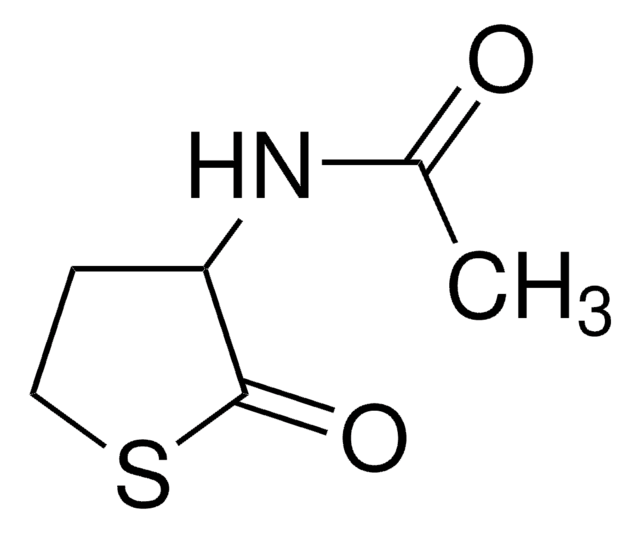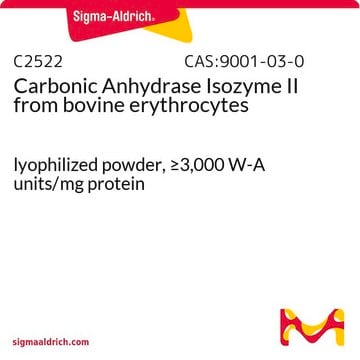すべての画像(3)
About This Item
実験式(ヒル表記法):
C4H7NOS · HCl
CAS番号:
分子量:
153.63
Beilstein:
3911455
EC Number:
MDL番号:
UNSPSCコード:
12352209
eCl@ss:
32160406
PubChem Substance ID:
NACRES:
NA.26
おすすめの製品
product name
L-ホモシステインチオラクトン 塩酸塩, ≥98% (TLC)
アッセイ
≥98% (TLC)
形状
powder
色
white
mp
185 °C
アプリケーション
detection
peptide synthesis
SMILES記法
Cl[H].N[C@H]1CCSC1=O
InChI
1S/C4H7NOS.ClH/c5-3-1-2-7-4(3)6;/h3H,1-2,5H2;1H/t3-;/m0./s1
InChI Key
ZSEGSUBKDDEALH-DFWYDOINSA-N
類似した製品をお探しですか? 訪問 製品比較ガイド
アプリケーション
- Effects of DL-homocysteine thiolactone on cardiac contractility, coronary flow, and oxidative stress markers in the isolated rat heart: This investigation demonstrates the effects of DL-homocysteine thiolactone on heart function, offering insights into its use in cardiovascular research and potential therapeutic applications (Zivkovic et al., 2013).
- Homocysteine is a novel risk factor for suboptimal response of blood platelets to acetylsalicylic acid in coronary artery disease: The study explores how L-homocysteine thiolactone could affect platelet responses in therapy for coronary artery diseases, pointing to its importance in cardiovascular therapeutics (Karolczak et al., 2013).
生物化学的/生理学的作用
アミン反応性試薬であるL-ホモシステインチオラクトンは、特にリジン残基でのタンパク質の翻訳後修飾の研究に使用されます。
保管分類コード
11 - Combustible Solids
WGK
WGK 3
引火点(°F)
Not applicable
引火点(℃)
Not applicable
個人用保護具 (PPE)
Eyeshields, Gloves, type N95 (US)
適用法令
試験研究用途を考慮した関連法令を主に挙げております。化学物質以外については、一部の情報のみ提供しています。 製品を安全かつ合法的に使用することは、使用者の義務です。最新情報により修正される場合があります。WEBの反映には時間を要することがあるため、適宜SDSをご参照ください。
Jan Code
H6503-BULK:
H6503-100MG:
H6503-5G:
H6503-VAR:
H6503-25MG:
H6503-250MG:
H6503-1G:
試験成績書(COA)
製品のロット番号・バッチ番号を入力して、試験成績書(COA) を検索できます。ロット番号・バッチ番号は、製品ラベルに「Lot」または「Batch」に続いて記載されています。
この製品を見ている人はこちらもチェック
Derrick L Sauls et al.
Thrombosis research, 127(6), 576-581 (2011-02-15)
We have shown that homocysteinemic rabbits have altered fibrinogen that forms fibrin clots with increased resistance to fibrinolysis. Homocysteine thiolactone is a metabolite of homocysteine (Hcys) that can react with amines and introduce a new sulfhydryl group into proteins. Recent
Homocysteine and its thiolactone-mediated modification of fibrinogen affect blood platelet adhesion.
Joanna Malinowska et al.
Platelets, 23(5), 409-412 (2011-10-21)
Homocysteine (Hcys) and homocysteine thiolactone (HTL) concentrations in organism are correlated with a number of serious pathologies. In the literature, there are few papers describing studies on the effects of homocysteine on proteins that participate in blood coagulation and fibrinolysis
Shima Jalili et al.
The protein journal, 30(5), 299-307 (2011-05-17)
Homocysteine thiolactone (HCTL) is a cyclic thioester of homocysteine, showing high reactivity toward lysine residues of proteins. In the present study the structural properties and aggregation propensity of bovine pancreatic insulin were studied in the presences of increasing concentration of
Han-Hsin Chang et al.
Molecular vision, 17, 1946-1956 (2011-08-19)
Hyperhomocysteinemia is known to cause degeneration of retinal ganglion cells, but its influence on photoreceptors remains largely unknown. In particular, the role of homocysteine-thiolactone (Hcy-T)--the physiologic metabolite of homocysteine that has been proven to be more cytotoxic than homocysteine itself--as
A Rašić-Marković et al.
Acta physiologica Hungarica, 98(1), 17-26 (2011-03-11)
The aim of our study was to investigate the effects of ifenprodil and MK-801 on D,L-homocysteine thiolactone induced seizures in adult rats.Male Wistar rats were divided into following groups: 1. Saline-treated (C, n=10); 2. D,L-homocysteine thiolactone 8 mmol/kg, i.p. (H
ライフサイエンス、有機合成、材料科学、クロマトグラフィー、分析など、あらゆる分野の研究に経験のあるメンバーがおります。.
製品に関するお問い合わせはこちら(テクニカルサービス)











